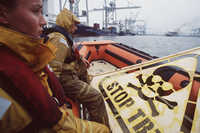|
The New Zealand government will soon decide whether it will agree to aim to eliminate dioxins - one of the most lethal synthetic chemicals known. Nations of the world will meet in early December to finalise agreements for an international toxics treaty, which is aiming to eliminate the dirty dozen; 12 organochlorine chemicals, which include dioxins. New Zealand is just one of a small group of countries that, so far, refuses to protect the environment and future generations from on-going production of dioxins. Also, at the last round of treaty negotiations, New Zealand would not agree to aim to eliminate dioxins. PlaNet asks, not unreasonably we feel, that the government will change its position in the upcoming negotiations and agree to aim to eliminate dioxins. The Hon. Marian Hobbs as Minister for the environment could lead New Zealand into a toxics free future. The Minister recently stated in a speech to the Auckland Environmental Business Network that preventing waste means designing waste and harmful chemicals out of all stages of the production processes. One way the Minister can show that she means what she says is to ensure that New Zealand joins the majority of nations and agrees to aim to eliminate dioxins. After all, why shouldn't New Zealanders be treated with the same respect for their health and environment? It has consistently been shown that New Zealand cannot "manage" these dangerous chemicals. In August this year, leaking drums of polychlorinated biphenyls (PCBs - one of the dirty dozen) were discovered in central Auckland. Test results showed PCB contamination was as high as 25,000 parts per million (ppm). In September, children's drinking water at a school near Invercargill was found with traces of the banned pesticide Dieldrin (another one of the dirty dozen). Both PCBs and Dieldrin were banned years ago, yet New Zealanders are still not protected from these harmful chemicals. If we can't manage banned chemicals, how can we manage dioxins that are still legally pumped into the environment? The only way to protect future generations and our environment is to aim to eliminate dangerous and deadly dioxins.d ..
|

